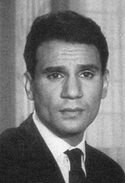Lettuce: Difference between revisions
Juan Lechuga (talk | contribs) |
m Reverted edits by Juan Lechuga (talk) to last revision by Santos Tags: Rollback Reverted |
||
| Line 1: | Line 1: | ||
{{Infobox country | {{Infobox country | ||
| | |conventional_long_name = | ||
| | {{collapsible list | ||
|common_name | |titlestyle = background:transparent; font-size:9pt; | ||
|title = {{resize|11.5pt|Bolivarian Republic of Lettuce}} | |||
|{{Infobox|subbox=yes|bodystyle= font-size:9pt;font-weight:normal; | |||
| rowclass1 = mergedrow| label1 = [[Wikipedia:Azerbaijani language|Lettucian]]: | data1 = Republik Bolivərian d'Lettuche | |||
| rowclass2 = mergedrow| label2 = [[Wikipedia:Spanish language|Spanish]]: | data2 = {{nowrap|República Bolivariana de Lettuce}} | |||
| rowclass3 = mergedrow| label3 = [[Wikipedia:Arabic|Arabic]]: | data3 = <div style="text-align: right;">{{lang|ar|nocat=true|جمهورية الخس البوليفارية}}</div> | |||
| rowclass4 = mergedrow| label4 = [[Wikipedia:Japanese language|Japanese]]: | data4 = レタスボリバル共和国 | |||
| rowclass5 = mergedrow| label5 = [[Wikipedia:Korean language|Korean]]: | data5 = 상추 볼리바르 공화국 | |||
| rowclass6 = mergedrow| label6 = [[Wikipedia:Italian language|Italian]]: | data6 = {{nowrap|Repubblica Bolivariana di Lattuche}} | |||
| rowclass7 = mergedrow| label7 = [[Wikipedia:Turkish language|Turkish]]: | data7 = Bolivarcı Letuçe Cumhuriyeti | |||
}} | |||
}} | |||
|common_name = Lettuce | |||
|image_flag = Flag of Lettuce.png | |image_flag = Flag of Lettuce.png | ||
|image_coat = | |image_coat = Coat_of_arms_of_Lettuce.png | ||
|symbol_type = Seal | |symbol_type = Seal | ||
|national_motto = '' | |national_motto = ''P'tra, sokəlisme or mort'é''<br><small>''Motherland, Socialism or Death''</small> | ||
|national_anthem = '' | |national_anthem = ''Lettuche. Tərt d'Gləriə!''<br><small>''Lettuce. Land of Glory!''</small> | ||
|image_map = Lettuce location.png | |image_map = Lettuce location.png | ||
|map_width = 290px | |map_width = 290px | ||
| Line 13: | Line 25: | ||
|capital = {{nowrap|[[Hugo Chávez City]]}} | |capital = {{nowrap|[[Hugo Chávez City]]}} | ||
|largest_city = {{nowrap|[[Hugo Chávez City]]}} | |largest_city = {{nowrap|[[Hugo Chávez City]]}} | ||
|official_languages = [[ | |official_languages = [[Wikipedia:Spanish language|Spanish]]<br>[[Wikipedia:Azerbaijani language|Lettucian]] | ||
|regional_languages = [[Wikipedia:Arabic language|Arabic | |regional_languages = [[Wikipedia:Arabic language|Arabic]]<br>[[Wikipedia:Japanese language|Japanese]]<br>[[Wikipedia:Korean language|Korean]]<br>[[Wikipedia:Italian language|Italian]]<br>[[Wikipedia:Turkish language|Turkish]] | ||
|demonym = Lettucian | |demonym = Lettucian | ||
|government_type = [[Wikipedia:Socialist state|Socialist parliamentary republic]] | |government_type = [[Wikipedia:Socialist state|Socialist parliamentary republic]] | ||
|leader_title1 | |leader_title1 = Prime Minister | ||
|leader_name1 = [[Wikipedia:es:Iván Moreira|Iván Moreira]] | |||
| | |||
| sovereignty_type = [[Wikipedia:Independence|Independence]] | | sovereignty_type = [[Wikipedia:Independence|Independence]] | ||
| sovereignty_note = from [[Gandhara]] | | sovereignty_note = from [[Gandhara]] | ||
| Line 76: | Line 86: | ||
|}} | |}} | ||
'''Lettuce''', officially the '''Bolivarian Republic of Lettuce''' ([[ | '''Lettuce''', officially the '''Bolivarian Republic of Lettuce''' ([[Wikipedia:spanish|Spanish]]: ''República Bolivariana de Lettuce'', [[Wikipedia:Language|Lettucian]]: ''Republik Bolivərian d'Lettuche''), is a [[Wikipedia:Socialist state|socialist state]] in [[Outernatia]]. It is bordered to the west by the [[Wikipedia:Sea|Artemitic Sea]]; to the north and northeast by [[Gandhara]]; and to the south and southeast by [[Raingate]]. Lettuce has a population of around 6.3 million people and its territory covers 41,885 km² (16,172 sq mi). Its [[Wikipedia:Capital city|capital]] and largest city is [[Hugo Chávez City]]. | ||
The Bolivarian Republic of Lettuce was established after the Bolivarian Revolution, which led to the establishment of a Socialist state on 25 | The Bolivarian Republic of Lettuce was established after the Bolivarian Revolution, which led to the establishment of a Socialist state on 25 Ausgust 2014. The current Prime Minister of Lettuce is [[Wikipedia:es:Iván Moreira|Iván Moreira]] since 2020. Lettuce is a founding member of the [[Outernatian Union]] and a member of the [[Union of Sovereign States]]. | ||
== History == | == History == | ||
| Line 102: | Line 110: | ||
On 6 October 2009, the general, legislative and presidential elections were held, which were characterized by a major defeat of the traditional political parties who as a whole lost more than 50% of the seats available in the House of Representatives. | On 6 October 2009, the general, legislative and presidential elections were held, which were characterized by a major defeat of the traditional political parties who as a whole lost more than 50% of the seats available in the House of Representatives. | ||
The winning party was the nascent [[United Socialist Party of Lettuce]] ([[ | The winning party was the nascent [[United Socialist Party of Lettuce|Partido Socialista Unido de Lettuce]] ([[Wikipedia:English language|English]]: ''United Socialist Party of Lettuce''), that obtained 60.5% of the votes, gaining an absolute majority in the House of Representatives with 13 of the 20 available seats. In addition, its presidential candidate, ex-[[Wikipedia:Colonel|colonel]] [[Wikipedia:Hugo Chávez|Hugo Chávez Frías]], obtained 65.6% of the votes. | ||
The new legislature was constituted on 1 January 2010. The first actions were the addition of the word "Bolivariana" to the official name of the Republic and the call for a [[Wikipedia:Constituent assembly|Constituent Assembly]] to reform the Constitution that ruled the country since 1980. For this purpose, the dissolution of the House of Representatives was arranged 3 months after being chosen and new elections were being held in September 2010 for a new National Assembly of 30 seats.<br><br> | The new legislature was constituted on 1 January 2010. The first actions were the addition of the word "Bolivariana" to the official name of the Republic and the call for a [[Wikipedia:Constituent assembly|Constituent Assembly]] to reform the Constitution that ruled the country since 1980. For this purpose, the dissolution of the House of Representatives was arranged 3 months after being chosen and new elections were being held in September 2010 for a new National Assembly of 30 seats.<br><br> | ||
| Line 162: | Line 170: | ||
[[File:Ivan Moreira.png|thumb|220px|right|[[Wikipedia:es:Iván Moreira|Iván Moreira]], prime minister of Lettuce.]] | [[File:Ivan Moreira.png|thumb|220px|right|[[Wikipedia:es:Iván Moreira|Iván Moreira]], prime minister of Lettuce.]] | ||
{{about||the most recent election|Lettuce general election 2020}} | {{about||the most recent election|Lettuce general election 2020}} | ||
Legislative branch is vested in | Legislative branch is vested in Lettucian National Assembly ([[Wikipedia:Spanish language|Spanish]]: ''Asamblea Nacional'') which consists of 45 members. Majority approval from Assembly is needed to pass legislation. | ||
Following an election reform in 2019, members of the National Assembly are elected every 5 years and grew in size to 45 members from the previous 30. The seats are elected directly through the proportional representation system whereby each state elects a set number of members to represent them in the Assembly. The number of members representing a state is determined by the population within that state. For example, the most populous state of Hugo Chávez has 11 members in the Assembly, while the least populous state of Fatma has 4 representatives. | Following an election reform in 2019, members of the National Assembly are elected every 5 years and grew in size to 45 members from the previous 30. The seats are elected directly through the proportional representation system whereby each state elects a set number of members to represent them in the Assembly. The number of members representing a state is determined by the population within that state. For example, the most populous state of Hugo Chávez has 11 members in the Assembly, while the least populous state of Fatma has 4 representatives. | ||
Following the most recent | Following the most recent general election in February 2020, the current prime minister is [[Wikipedia:es:Iván Moreira|Iván Moreira]] of the United Socialist Party of Lettuce. | ||
[[File:Lettucian National Assembly.jpg|thumb|320px|right|The Lettucian National Assembly.]] | [[File:Lettucian National Assembly.jpg|thumb|320px|right|The Lettucian National Assembly.]] | ||
{| class="wikitable" | {| class="wikitable" | ||
| Line 178: | Line 186: | ||
|style="background-color:red" width=2 | || [[United Socialist Party of Lettuce]] || 18 | |style="background-color:red" width=2 | || [[United Socialist Party of Lettuce]] || 18 | ||
|- | |- | ||
|style="background-color:#0c81a5" width=2 | || | |style="background-color:#0c81a5" width=2 | || Liberty, Justice and Development || 10 | ||
|- | |- | ||
|style="background-color:#F01990" width=2 | || [[Lettucian Asian Front]] || 5 | |style="background-color:#F01990" width=2 | || [[Lettucian Asian Front]] || 5 | ||
| Line 188: | Line 196: | ||
|style="background-color:#8c0000" width=2 | || [[Communist Party of Lettuce]] || 2 | |style="background-color:#8c0000" width=2 | || [[Communist Party of Lettuce]] || 2 | ||
|- | |- | ||
|style="background-color:#ff4d00" width=2 | | | |style="background-color:#ff4d00" width=2 | || Humanist Party || 1 | ||
|- | |- | ||
|style="background-color:#6b6565" width=2 | || [[Turkish for Sovereignty]] || 1 | |style="background-color:#6b6565" width=2 | || [[Turkish for Sovereignty]] || 1 | ||
Revision as of 20:13, 3 June 2023
Motto: P'tra, sokəlisme or mort'é Motherland, Socialism or Death | |
Anthem: Lettuche. Tərt d'Gləriə! Lettuce. Land of Glory! | |
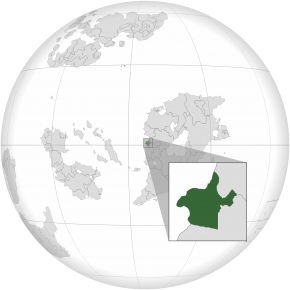 | |
| Capital and largest city | Hugo Chávez City |
| Official languages | Spanish Lettucian |
| Recognised regional languages | Arabic Japanese Korean Italian Turkish |
| Demonym | Lettucian |
| Government | Socialist parliamentary republic |
• Prime Minister | Iván Moreira |
| Independence from Gandhara | |
• Lettucian Independence Act | 15 August 1957 |
| 14 May 1958 | |
• Declaration of Bolivarian Republic | 1 January 2010 |
| Area | |
• Total | 41,885 km2 (16,172 sq mi) |
| Population | |
• 2019 census | 6,307,486 |
• Density | 150.6/km2 (390.1/sq mi) |
| Currency | Lettucian Peso (PLT) |
| Date format | DD/MM/YYYY |
| Drives on the | right |
| Calling code | 63 |
| Internet TLD | .lc |
Lettuce, officially the Bolivarian Republic of Lettuce (Spanish: República Bolivariana de Lettuce, Lettucian: Republik Bolivərian d'Lettuche), is a socialist state in Outernatia. It is bordered to the west by the Artemitic Sea; to the north and northeast by Gandhara; and to the south and southeast by Raingate. Lettuce has a population of around 6.3 million people and its territory covers 41,885 km² (16,172 sq mi). Its capital and largest city is Hugo Chávez City.
The Bolivarian Republic of Lettuce was established after the Bolivarian Revolution, which led to the establishment of a Socialist state on 25 Ausgust 2014. The current Prime Minister of Lettuce is Iván Moreira since 2020. Lettuce is a founding member of the Outernatian Union and a member of the Union of Sovereign States.
History
The Lettucian governorate has separated from Gandhara through the Lettucian Independence Act, signed on 15 August 1957 in response to the Gandhari Revolution. The population, mostly Christian, feared the loss of several privileges that were granted under the Al-Mansur dynasty.
After a couple of months of negotiations, the new Gandhari Goverment and the Goverment of the First Lettucian Republic agreed on the terms under which Lettuce would become independent, while Gandhara would keep access to the sea. The conclusions of the negotiations were listed in the Treaty of Vola signed on 14 May 1958 by the President of Gandhara, Ahmed Assiri, and the Prime Minister of Lettuce, Carlos Ibáñez del Campo.
Bolivarian Republic of Lettuce
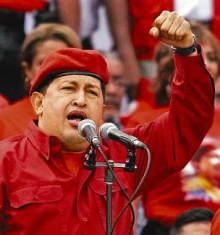
On 6 October 2009, the general, legislative and presidential elections were held, which were characterized by a major defeat of the traditional political parties who as a whole lost more than 50% of the seats available in the House of Representatives.
The winning party was the nascent Partido Socialista Unido de Lettuce (English: United Socialist Party of Lettuce), that obtained 60.5% of the votes, gaining an absolute majority in the House of Representatives with 13 of the 20 available seats. In addition, its presidential candidate, ex-colonel Hugo Chávez Frías, obtained 65.6% of the votes.
The new legislature was constituted on 1 January 2010. The first actions were the addition of the word "Bolivariana" to the official name of the Republic and the call for a Constituent Assembly to reform the Constitution that ruled the country since 1980. For this purpose, the dissolution of the House of Representatives was arranged 3 months after being chosen and new elections were being held in September 2010 for a new National Assembly of 30 seats.
Administrative divisions
Lettuce is administratively divided into 6 states, which have a large degree of autonomy from the nation's capital. This division also reflects the different ethnicities and nationalities living the the territory: Gandharis, Japanese, Korean, Turkish, Spanish, Sanmarinese and Lettucians. These states in turn have their own subdivisions.
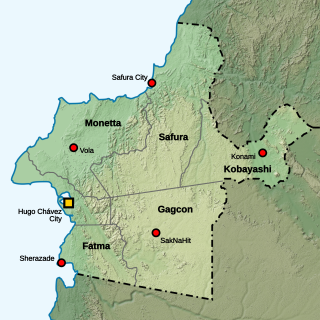
| ||||
| Flag | State (Stat) | Capital | Population (hab) | Area (km2) |
|---|---|---|---|---|
| Hugo Chávez | Hugo Chávez City | 1,545,687 | 4,473.83 | |
| Monetta | Vola | 892,335 | 7,874.38 | |
| Safura | Safura City | 909,016 | 9,626.53 | |
| Gagcon | SakNaHit | 1,002,544 | 8,051.34 | |
| Kobayashi | Konami | 1,377,997 | 8,152.91 | |
| Fatma | Sherazade | 579,907 | 4,733.01 |
Politics
Political system

Legislative branch is vested in Lettucian National Assembly (Spanish: Asamblea Nacional) which consists of 45 members. Majority approval from Assembly is needed to pass legislation.
Following an election reform in 2019, members of the National Assembly are elected every 5 years and grew in size to 45 members from the previous 30. The seats are elected directly through the proportional representation system whereby each state elects a set number of members to represent them in the Assembly. The number of members representing a state is determined by the population within that state. For example, the most populous state of Hugo Chávez has 11 members in the Assembly, while the least populous state of Fatma has 4 representatives.
Following the most recent general election in February 2020, the current prime minister is Iván Moreira of the United Socialist Party of Lettuce.
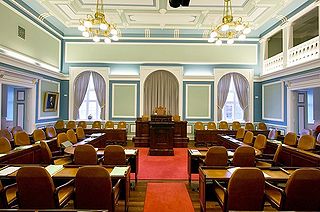
| Lettucian National Assembly | |||
|---|---|---|---|
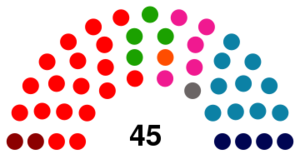
| |||
| Party Name | Seats | ||
| United Socialist Party of Lettuce | 18 | ||
| Liberty, Justice and Development | 10 | ||
| Lettucian Asian Front | 5 | ||
| Conservative Party | 4 | ||
| Pan-Arabic Party of Lettuce | 4 | ||
| Communist Party of Lettuce | 2 | ||
| Humanist Party | 1 | ||
| Turkish for Sovereignty | 1 | ||
| Total seats | 45 | ||


